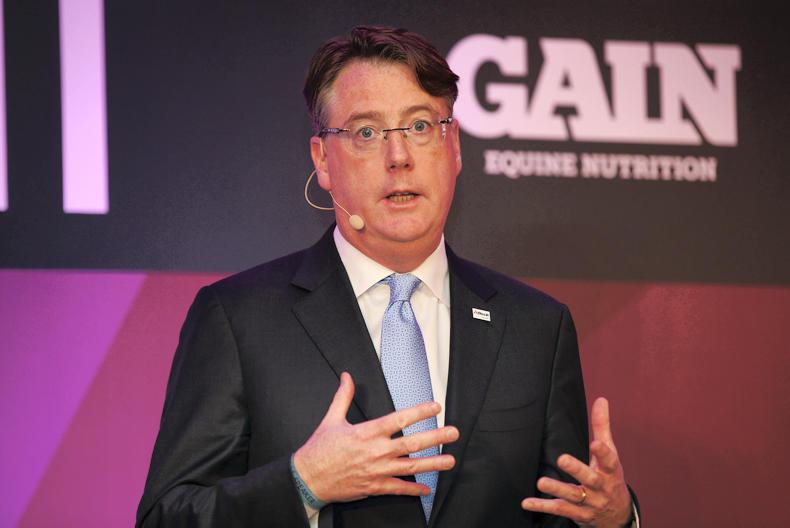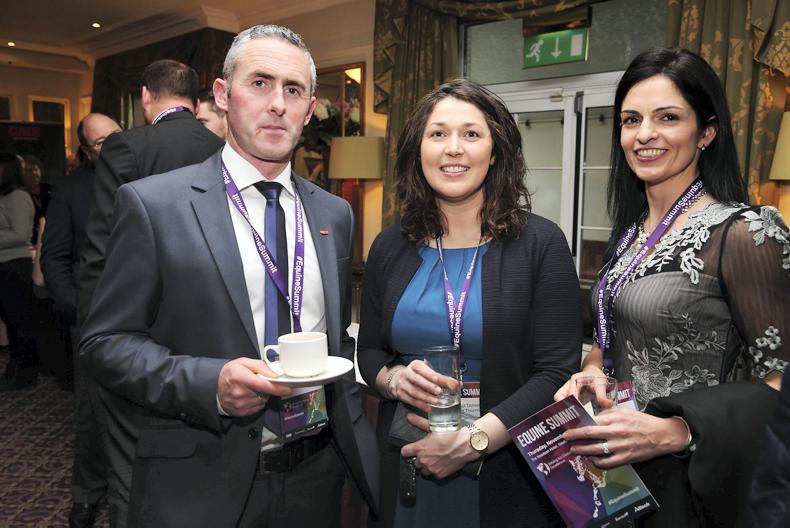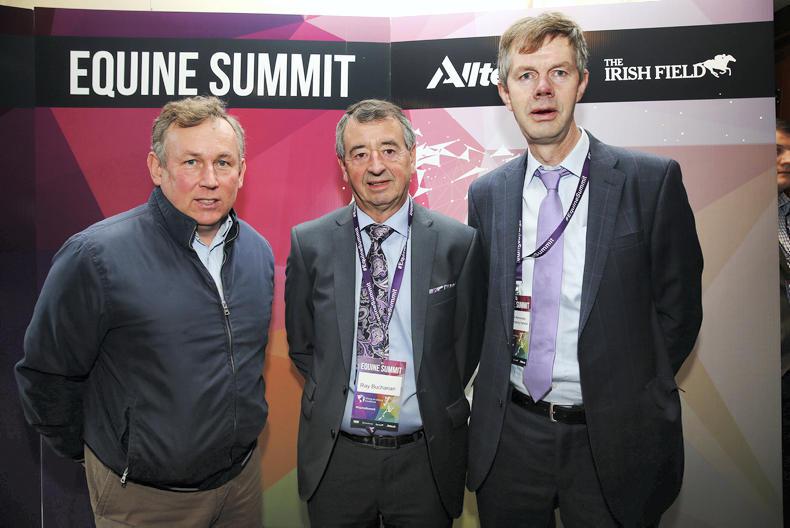ANY disappointment that founder and president of global animal health giant Alltech, Dr Pearse Lyons, was not delivering the keynote address to the packed Equine Summit were very quickly dispelled when Alltech’s Aidan Connolly took to the stage.
For Alltech’s chief innovation officer and vice president ignited the 400-strong audience from the get-go with a bold and challenging speech which remained one of the talking points of the day.
Flying in from Kentucky to attend the event, the Irish native, who recently attended what he termed the “incredibly inspiring” Web Summit in Lisbon, certainly lived up to his early stated mission to get the audience thinking.
“My purpose to to challenge you today. I fundamentally think your business is changing in a way that is unimaginable. In Lisbon, I saw two robots on stage having a debate. As Professor Stephen Hawkins said, this is not going to be business as usual. Where are we going? We have talked about grass, about training, but are these going to be the things to make us different in the end. How does Ireland stay ahead of the curve?”
Connolly asked a horse person in Kentucky, what keeps them up at night? And their three-fold reply provided plenty of food for thought on our side of the water.
“Over reliance on betting in our business is a real challenge. It’s seeping away to online betting.
“Human capital – not everyone wants to work in a horse farm anymore, we are competing with other businesses.

Philip Gilligan, Gain Equine Nutrition, Bridget Doherty and Anne Marie Haughey, Grant Thornton, at the Equine Summit (Photo: Caroline Norris)
“Drugs (equine doping) are an issue. When The New York Times has a discussion on the front page about what is being given to horses to make them achieve, this is the elephant in the room.”
Solutions suggested included the need to create a world-class experience around the equine industry.
Embracing technology and education is essential.
“We need to generate alternative sources of industry funding, we need to act as one business and one sector, attract new sponsors and collaborative marketing across all of the sectors. Old thinking is no longer quite so easy.
“How do we reinvent? We are competing with other sporting events. The good news is that they are all in trouble as well. This is a real challenge for a lot of different businesses, not just for you.”
Connolly cited social media as “a vital part’’ and suggested ways to enhance the experience of going racing or to equestrian events for spectators including the wearing of goggles to tell people more about what is actually happening.
Speaking of the Alltech World Equestrian Games in France in 2014, he described its impact on Normandy as “huge’’, adding “what a pity it did not come to Ireland, huge audiences, sites full, creating revenue and companies choosing to base themselves in that country.”
HUMAN CAPITAL
Speaking about the challenge of attracting young people into the equine industry and retaining them, Connolly said: “We are competing with other businesses, retaining talent and attracting talent is important. We need to think about re-inventing the job and your career path. We need to show a career path when they come to join us, a 10-year pathway, not just an 18-month programme. If you want the best people you have to train them.
“Technologies are coming at a rate of knots in the horse industry. People say it will never be disrupted but the taxi and the hotel businesses said that. Who is going to tear up and reinvent the horse business? If we do not do it in Ireland, who is going to do it?
Showing examples of 3-D Printing which could possibly help with everything from tractor breakdowns to repairing equine injuries, Connolly said robots can scan a horse in 90 seconds today and challenged the audience with the use of drones to assess grass growth in fields or sensors in saddles to detect everything from the horse’s pulse to predicting a colic.
“Are we first or last to embrace technology? Could artificial intelligence predict the winner of the Kentucky Derby for instance? Virtual Reality can allow people experience the thrill of being a horse rider; it is now teaching vet students to do operations.
“Block Chain is a digital leger which traces the horse through its lifetime, right at your fingertips. There is a gold rush of companies going into this technology,” said Connolly who described Block Chain as “transformative”.
Touching on performance nutrition including Alltech’s YEA-SACC and the “exciting” DHA part of Omega 3, extracted from algae, Connolly said: “I believe we need to do a better job of feeding nutrition properly.”
TAKE HOME MESSAGE
Wrapping up his thought-provoking presentation, Connolly left the audience with a three-fold take-home message.
Asked by Gain Equine Nutrition’s modulator Joanne Hurley, what will define the winners/losers in the horse business in the future, Connolly said: The amount of improvement you can do from a training point of view, you must create the sense we are going to be the first to try things. The speed of implementation/innovation will separate the winners from the losers.
Connolly gave his last word of advice to young people. “Get a passport and start travelling. Find time to visit India and China. The future is understanding China, India, Russia and Brazil. Do it when you are young. See the world.”


 This is a subscriber-only article
This is a subscriber-only article
 It looks like you're browsing in private mode
It looks like you're browsing in private mode







SHARING OPTIONS: